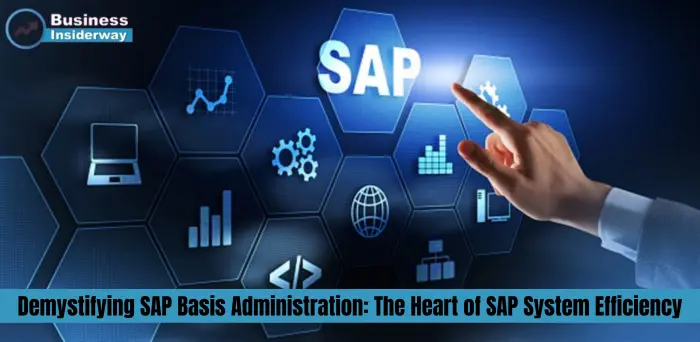Key Takeaways:
- In-depth understanding of SAP Basis and its vital role in enterprise environments.
- Exploration of SAP Basis Administration as a pillar for operational excellence.
- Insight into the strategic management and optimization of SAP systems.
- Discussion of the challenges SAP Basis Administrators face and how they overcome them.
- Future trends that will shape the landscape of SAP Basis Administration.
- Guidance for building a career in SAP Basis and resources for professional development.
Understanding SAP Basis Administration
In the modern business world, the reliance on sophisticated IT solutions has become the norm. Central to many corporate IT landscapes is the SAP system, underpinned by the technical expertise of SAP Basis Administration.
Throughout the decades, the SAP Basis Administration has evolved significantly. The role that began as primarily technical support has blossomed into one that intersects closely with business optimization. This shift not only underscores the importance of Basis Administrators in keeping systems running but also highlights their role in driving innovation. With SAP environments becoming increasingly intricate and businesses pursuing digital transformation, the expertise of SAP Basis professionals has never been more vital. They need to possess a firm grasp of technical details and an understanding of how these details impact and drive business goals.
The Building Blocks of SAP Basis
The SAP Basis module is an administrative platform for SAP applications, comprising various components such as the database, application server, and client-server architecture. These components facilitate the functioning of end-to-end business processes, ensuring smooth interoperability and real-time processing of transactions. SAP Basis encapsulates the administration of the entire SAP system – involving tasks like managing user accounts, overseeing system backups, and keeping the system landscape in optimal condition.
Its effectiveness lies in its ability to bridge disparate elements, enabling modules like FI (Financial Accounting), MM (Materials Management), and SD (Sales and Distribution) to perform collectively as one cohesive business solution. Acting as the glue that holds various aspects of the system together, SAP Basis Administration is a critical component that ensures the robust performance and harmonious operation of business processes enabled by SAP systems. It involves complex tasks, including configuration, installation, troubleshooting, and performance tuning, all requiring a detailed knowledge of SAP systems and how they intertwine with the underlying hardware and network infrastructure.
From a performance standpoint, the SAP Basis is pivotal. It plays a decisive role in upholding system sustainability and responsiveness. Well-oiled Basis operations translate into enhanced productivity and user satisfaction. This is achieved by tuning the system to meet users’ needs, executing seamless upgrades, and ensuring that the latest services and features are always within reach. Administrators often leverage sophisticated monitoring tools to preemptively identify potential performance bottlenecks and maintain an ecosystem that operates at peak efficiency.
Strategic Management of SAP Environments
Strategic management of SAP systems isn’t just about tackling current issues; it’s about preempting potential pitfalls and ensuring the longevity and scalability of the system. This involves a meticulous approach to monitoring and fine-tuning, employing proven methodologies to keep the system agile and responsive. Best practices dictate a proactive stance on system management, which involves routine preventative measures, strategic planning around capacity, and maintaining robust security protocols. Scheduling regular backups, for instance, is essential for data preservation and ensuring quick recovery in case of unexpected system failures.
Successful SAP environments are often characterized by their proactive approach to issue resolution. Basis Administrators can mitigate risks that could hamper business workflows through real-time system monitoring or predictive maintenance. Companies that integrate analytics into their system management can uncover valuable insights that inform strategic decisions, enhance system functionality, and contribute to the overall satisfaction of users and customers.
Maintaining System Health and Security
A keen awareness of system health and security is non-negotiable for SAP Basis Administrators. This facet of their work is akin to conducting regular health assessments to ensure each system component operates at total capacity without hiccups. Regular monitoring includes:
- Analyzing system logs.
- Keeping abreast of the latest patches and updates.
- Performing audits to ensure that only authorized users have access to sensitive data.
A strong Basis administration plan ensures all system health indicators are scrutinized, from CPU and memory consumption to disk space and network availability, preempting issues that could harm workflow continuity.
Secure the SAP landscape from unauthorized access and potential breaches that could compromise sensitive data. Basis Administrators play a frontline defense role, implementing robust security measures like regular password changes, encryption, and detailed access control mechanisms. Their vigilance is paramount in upholding industry standards and regulatory compliance and protecting corporate data in a landscape increasingly targeted by cyber threats. By establishing a secure and compliant SAP environment, Basis Administrators help businesses reduce risks, prevent losses, and maintain trust with stakeholders and customers.
Challenges Faced by SAP Basis Administrators
Professionals in the SAP Basis domain face various challenges, from technical complexities to broader business issues. A common challenge is navigating through integration concerns when linking SAP with other systems. Moreover, SAP Basis Administrators are often the first responders during system downtime, where quick, insightful action is required to minimize operational disruptions. System performance issues, capacity planning, and adapting to rapidly changing technologies are hurdles that demand both deep technical expertise and a problem-solving mindset from Basis professionals.
Moreover, technology evolves quickly, and staying updated with the latest SAP iterations, features, and tools is a must for any professional in the field. Continuous skill development, characterized by regular training and certifications, helps administrators remain competitive and efficient. Advanced tools, whether related to diagnostics, automation, or system administration, are being developed constantly. SAP Basis Administrators must leverage these tools to streamline workflows and enhance system reliability.
Future Trends in SAP Basis Administration
As we gaze into the future, several trends on the technological horizon promise to redefine the role of SAP Basis Administration. The rise of automation, for example, is set to revolutionize the way administrative tasks are executed. This can significantly reduce manual workloads, allowing administrators to focus on more strategic, value-added activities. Automated monitoring tools, predictive analytics, and machine learning algorithms are becoming increasingly integral in the operational toolkit of SAP Basis professionals for improving efficiency and predicting system behavior.
Migrating to cloud-based infrastructures is another trend that significantly affects SAP Basis Administration. The increasing adoption of cloud services necessitates a diverse skill set for Basis Administrators, one familiar with the nuances of cloud technology and traditional on-premises solutions. As businesses strive to balance flexibility, cost, and functionality, SAP Basis Administrators will be pivotal in guiding them through this transformative journey and ensuring a smooth transition to cloud services while maintaining service quality and security.
Optimizing SAP Upgrades and Migrations
As SAP continuously enhances its products, staying current with upgrades is imperative for leveraging new functionalities and maintaining support. If managed proficiently, SAP upgrades can lead to improved system stability, expanded feature sets, and a more seamless user experience. Structured planning, robust testing, and user training are all cornerstone elements of a successful upgrade strategy. SAP migrations also involve moving systems from one environment to another, such as during cloud adoption, hardware refreshes, or consolidation efforts. These migrations are intricate processes that require comprehensive planning to mitigate risks, minimize downtime, and ensure a smooth transition that upholds data integrity and business continuity.
Celebrated within the community are those enterprises that recount their migration successes, often serving as benchmarks for strategic planning and efficient execution. Their narratives emphasize the importance of systematic preparation and validation at each step. Whether these migrations are driven by cost considerations, performance improvements, or strategic IT alignment, the goal remains to complete them with precision and due diligence, effectively future-proofing the SAP investment.
Interfacing SAP Basis with Other IT Disciplines
The convergence of SAP Basis with other IT disciplines is crucial for ensuring cohesive system performance and maximizing the benefits of SAP systems. Effective collaboration among IT teams, which may include network engineers, database administrators, and application developers, is vital for eliminating silos and fostering a more integrated IT environment. Therefore, SAP Basis Administrators frequently collaborate with other IT professionals to ensure that SAP systems are well-supported and integrated with the overall IT strategy. These collaborations can improve system robustness, reduce complexities, and provide a more agile response to changing business demands. Complementary technologies and methodologies, such as DevOps, are increasingly adopted to enhance the overall lifecycle of SAP applications, from development through maintenance.
Good interdepartmental communication is critical to realizing the full potential of SAP Basis. It involves technical dialogue and strategic discussions that align IT initiatives with business objectives. By capitalizing on a shared understanding and common goals, IT departments can synchronize their efforts to drive innovation, efficiency, and value creation across the enterprise.
SAP Basis as a Career: Pathways and Progression
A career in SAP Basis Administration offers a unique mix of technological challenges and business engagement. For individuals looking to enter this field, getting started typically involves foundational knowledge acquired through academic courses or SAP’s certification programs — providing a solid springboard into this IT specialty. As one gains experience, the career path can lead to roles such as senior SAP Basis consultant, team lead, or even SAP Basis manager, with each step providing new challenges and opportunities for professional growth.
The landscape of SAP is dynamic and evolving, making it essential for professionals in this field to remain lifelong learners. Committing to continuous education, upskilling, and staying current with the latest SAP developments can shape a successful and fulfilling career in basic administration. As technology progresses, specialized knowledge in areas such as cloud technologies and security will be especially prized, offering avenues for SAP Basis professionals to differentiate themselves and advance their careers.
Resources and Communities for SAP Basis Professionals
They are staying current in a field as fast-paced as SAP Basis, which requires a commitment to lifelong learning and a keen utilization of resources. The internet provides educational content for SAP professionals, including forums, articles, webinars, and training sites, where best practices and the latest trends are shared. These resources help professionals keep their skills sharp and their knowledge current in a constantly evolving industry.
Participation in professional communities can be immensely beneficial, providing a platform for SAP Basis professionals to exchange experiences, seek advice, and network with peers. Engaging with these communities can lead to a better understanding of everyday challenges, creative solutions, and strategic insights. Further enhancing the professional landscape are programs and initiatives focused on inclusivity, such as SAP’s commitment to training, exemplifying an investment in the growth and development of diverse talent pools. Additionally, SAP’s dedication to enhancing the user experience and efficiency is presented by the roll-out of Next-Generation Support tools, which demonstrate a forward-thinking approach to IT support tailored to the ever-evolving needs of the modern enterprise.














